(Naresh Fernandes is the Editor of the Scroll.in since its inception and has shaped the digital platform. Scroll.in began its journey on 26th January 2014 and is regarded as one of the best digital portals in India. This interview with Naresh Fernandes was conducted on 8th January 2020 as the Scroll.in was completing its sixth year. In this candid interview, he talks with Sankalp Gurjar about the strengths and limitations of a digital platform, competition, and constraints in the media world, online trolling, and the challenges facing journalism. He firmly believes that 'irrespective of the medium you are working for, you can rankle people in power' and that digital media is more rewarding than other mediums but also requires more capable people.)
Many media houses through their reporting and opinion articles seek to influence policy and politics. What’s the experience of Scroll in this regard? A more general question would be, can online media platforms influence policy/politics as TV and/or print manage to do?
I realized early in my career that the ecosystem of journalism wants to believe that ‘we change the world’ but it is our readers who change the world! You generate public opinion through your news reporting and articles which puts pressure on people in power. Your stories shape the opinion of readers and if they feel strongly about something, they may raise these issues. They may ask questions and seek answers and clarifications.
I firmly believe that irrespective of the medium you are working for, you can rankle people in power. Let me give you a horrifying example: our reporter Malini Subramanyam was reporting from Chhattisgarh. The government and people didn’t like her stories. Her home was attacked and she was driven out of her home in Jagadalpur. We realized that no matter what medium you write for if you do your reporting properly, people will take you seriously. However, can this result in change? But Scroll has continued reporting from central India and on issues of Adivasis. My colleague, Supriya Sharma, reported about the Pathalgadi movement and how the state government was handling. And one of her stories was about the fact that 10000 people were charged with sedition. Her article was retweeted by Hemant Soren. When his JMM came to power, among its first decisions was to drop these sedition charges. So, to answer your question, yes, if you do your work, you can influence policy/politics.
So primarily, Scroll’s readership is based in India, or people from abroad read Scroll too?
Most of our readership is from India but about 15% is outside the country. These are Indians who are based abroad or foreigners who are interested in developments in India. We also have a significant readership within the South Asian region, i.e. in Pakistan, Bangladesh, and Sri Lanka, etc. We also do content exchanges with media outlets based in South Asia such as The Dawn, Dhaka Tribune, etc. If we cover any foreign story, usually we cover the neighborhood. Also, when Scroll had greater resources, we had journalists/writers from South Asia writing about what is happening in those countries. It was not restricted to politics only. They would write about a film that was being talked about or a book or a music show that was part of the national conversation. It was a rich section in terms of content. But, due to budgetary constraints, we are no longer able to do that.
We have been talking about readership in great detail. I would like to know is there any way of measuring how many people read Scroll regularly?
We use Google Analytics, which gives us data regarding how many people are visiting Scroll, their frequency, the articles that they primarily read, etc. We get weekly, monthly data as well. We get data about ‘unique visitors’ as well. Counting unique visitors is a fairly reliable method of gauging your reach and readership. In this method, frequency does not become a factor in counting your audience. (If a reader visits Scroll for 15 times a month, he will still be counted as one unique visitor and not as 15 separate visitors.)
Could you tell us about how many readers read Scroll on the phone and how many using the laptop?
Yes, our 90% readership reads Scroll on mobile phones.
What are your views on Indian journalism?
I think, generally speaking, we are at an inflection point. Journalism has become much more partisan than I have ever seen in my career. Mainstream publications aligning with the government and questioning opposition is a reversal of journalistic roles. It is not just baffling but quite dangerous for Indian democracy. You can hope that journalists realize that their primary function is to hold power to account.
Why is this happening?
It’s been happening for some time now. Some of these media outlets are ideologically motivated. They believe in the Hindutva project. Many others are scared of reprisals that would arise if they take an anti-regime stand. Some individual journalists are doing this in the hope of getting rewards.
But wasn’t this happening before as well? What exactly has changed?
I don’t think it has ever played out in such a stark fashion. Yet, now and then I come across people who ask me why media is criticizing the government only now and has not done so before. I remind them the UPA government fell because of the corruption scandals that were exposed by media like Radia tapes, Commonwealth Games, Coalgate, etc.
Scroll as an outlet, and Scroll journalists, are regularly targeted by right-wing trolls. How do you deal with this? Does it affect you in any way?
Not really. A lot of the criticism that we are getting is coming from bots. Bots are fake accounts that are created for the sole purpose of trolling. Therefore, at first glance, it may seem like a lot of criticism, but it is not.
How does your experience help you in running a digital news outlet? You were primarily a print journalist who is editing a digital publication. How does it work out?
Well, most of us who are working at Scroll were primarily print journalists. I started with the Times of India. I used to edit cultural and city, and a magazine called ‘Time Out’. I bring my experiences and interests from these publications to Scroll. I am fortunate to have a young and energetic team with varied interests around me now. Therefore, ultimately, we bring out a publication that reflects all of these things.
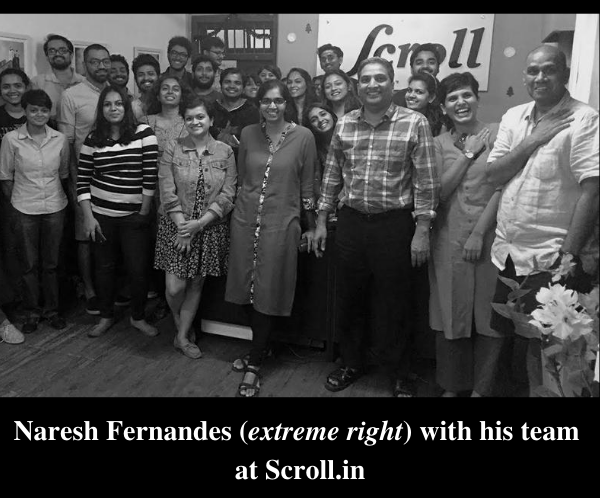
Scroll is not based in Delhi. Does Delhi matter for an online media outlet?
I am among the few fortunate people in the world who can walk to work. I live in Bandra and the office is 10 minutes away. Because we are not in Delhi, we don’t have the Delhi-centric view of the world. But that doesn’t mean we take a Mumbai-centric view. We have our reporters based across the country including Srinagar, Kolkata, and Guwahati which is why our edit meetings take place via conference calls. All of us contribute to the edit meeting, share our perspectives, and that determines how we see the world.
Is the newsroom for an online platform any different from the newspapers’ newsroom?
Yes. Although we have offices in cities like Delhi, people are not necessarily sitting in the office for meetings. They join us on the phone. Because we are small, we can take decisions quickly. But our primary emphasis is not to report on the phone but to go out and report. So for example, when the attack on JNU took place, three of my colleagues were there without us telling them to.
Scroll has recruited people from traditional media outlets or did it create a new set of journalists dedicated to the digital medium?
Except for a few people, who started their careers at Scroll, everybody is from a print background. Everybody has some wok experience. It matters for an online, small outlet like Scroll because you need people who have experience. It helps in betting a better story out, faster, and with accuracy. Having experienced people also mean that they know what they are doing.
There is a perception that online outlets do not need senior, more capable journalists; rather freshers and people with lesser capabilities are more suited for online media. But what you are saying is exactly the opposite of that.
Yes, you need more capable people for online outlets. It’s a little like working for a news wire. There, they have people who are rigorous and know what they are talking about.
So, can people from Scroll go back to newspapers?
Yes, why not? The skillset required for both is the same. But I think, digital is more rewarding than print publications. Most of the print publications cannot give enough space to a writer. Although digital is more pressure environment because you need to cover stories throughout the day. Also, digital allows you to correct your mistake which is not possible with print, once the copy is sent for publication.
Scroll’s opinion section features very few well-known names. Why is that so? Is it a conscious decision?
No, established names often prefer to write for print. But we have been fortunate to be able to feature very respectable commentators like Ramachandra Guha, Mukul Kesavan, and others.
There is a sense that it’s not easy to publish at Scroll. Is it true?
Yes, we don’t publish articles that lack rigor. We also maintain certain standards. But we have many young academics writing for us. Also, our primary focus is on publishing reportage than on opinion pieces.
But isn’t reporting more expensive?
Yes, but we realized that there is plenty of opinions floating around but there is still a need for more credible news reporting. That’s why we focus on reporting. Our readers also know that.
What is your opinion is the biggest challenge for journalists today?
The job of the journalist is to defend the constitutional values and not to defend the government in power. But in upholding that duty, does an advertiser want to be associated with you or not becomes a question. In the case of advertising revenues, the slowing economy also affects that. Falling revenues put constraints on the news outlets. For many journalists, finding a media house that will allow you relatively more freedom to work is a challenge; otherwise, while covering a story, many times journalists have to think about the reactions from their owners, management, etc.
What skills should a prospective journalist have?
Finding information on many things is less of a challenge. For example, government databases are available online and it is so much easier to contact people in faraway places to check information. I think prospective journalists should be curious about the world, and be skeptical about their assumptions.
Part 1 of this interview can be found here.
(Kartavya is celebrating its first anniversary on 9th August. On the backdrop of this special occasion, we will publish comprehensive interviews of three renowned editors of English journalism for seven consecutive days starting today, that is, August 9th to August 15th.
N. Ram's interview has been published in three parts and sheds light on the past and present of The Hindu. Naresh Fernandes' interview has been published in two parts and will talk about Scroll.in. And lastly, Shekhar Gupta's interview will be published in three parts which will address his career with The Indian Express, India Today, and The Print. Although these editors belong to three different generations and have a differing point of view on some issues, their commitment to the core values of journalism is alike.
The Marathi translation of this interview has been published in the 15th August 2020 edition of weekly Sadhana.)
Tags: naresh fernandes interview scroll.in journalism sankalp gurjar Load More Tags

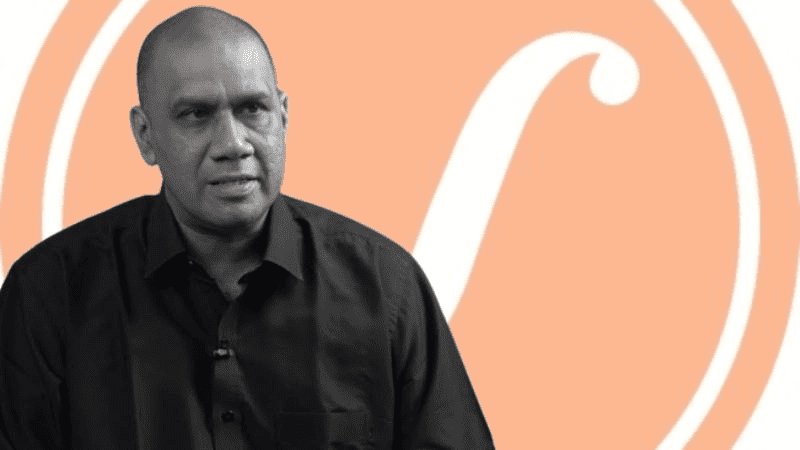
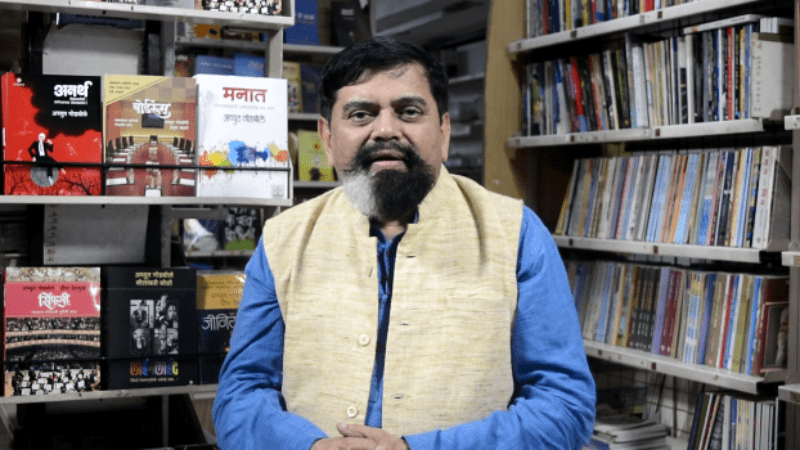
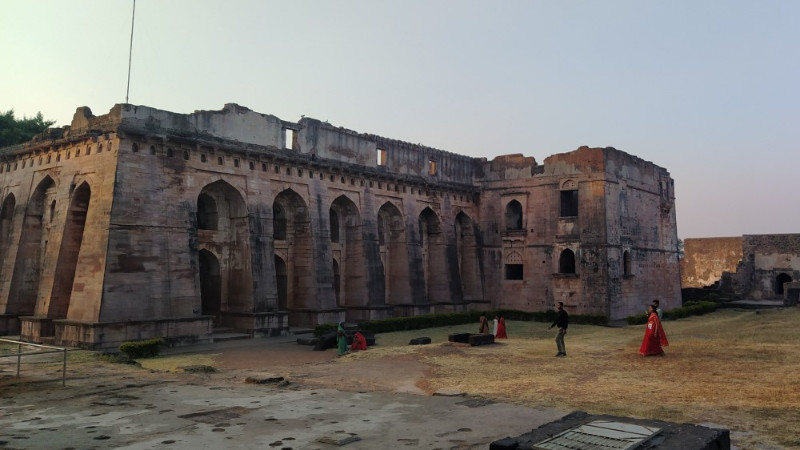


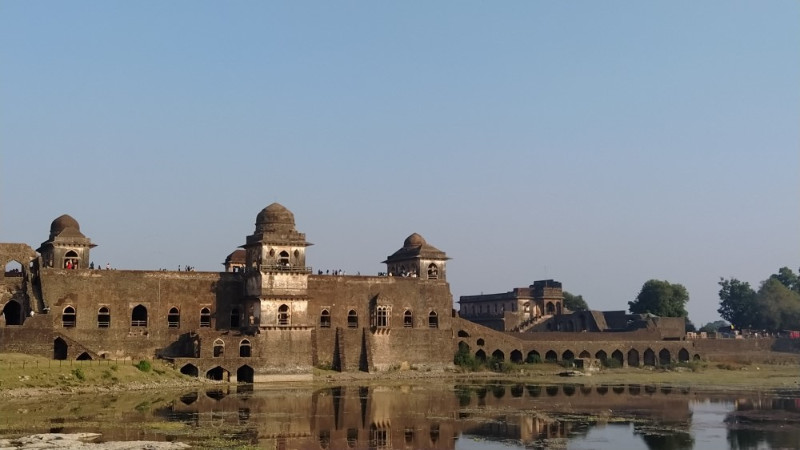
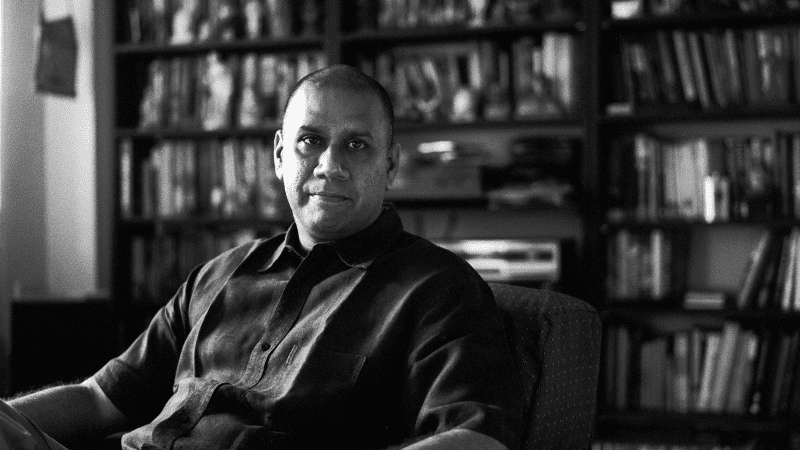

























Add Comment